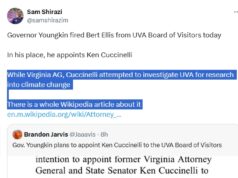From VA Senate Majority Leader Scott Surovell’s office:
SENATORS PEKARSKY AND HASHMI INTRODUCE LEGISLATION TO CREATE A CELL PHONE-FREE ENVIRONMENT IN VIRGINIA SCHOOLS
RICHMOND, VA—Today, Senate Majority Leader Scott Surovell announced that the members of the Senate Democratic Workgroup on School Mobile Phone Policy have introduced legislation to enhance distraction-free learning environments for Virginia students. Senate Democrats have a strong commitment to prioritizing student success in Virginia and share the Governor’s aspiration to limit distractions in the classroom. This is best and actually accomplished through bipartisan collaboration within the legislative process, through which Senate Democrats aim to give elected school boards the ability to craft the best cell phone policies for their districts consistent with state and federal law and existing educational governance process which is not governed by Executive Orders.
In contrast to the Governor’s policy, this legislation includes the following:
- Specifically prioritizes SPED students, IEP, or 504 plans and includes protections for students who use their devices for accommodations for which cell phone usage is necessary.
- Clarifies that no violation of these policies alone shall constitute suspension or expulsion of a student, and ensures enforcement does not result in expulsion that leads to a loss of academic time that would defeat the purpose of cell phone free classroom learning.
- Ensures the responsibility of enforcement is on the administration, not teachers who are already overburdened in the classroom.
This legislation certifies that classrooms can be distraction-free while maintaining student safety and family communication.
“While we applaud Governor Youngkin prioritizing a dialogue on school mobile phone use by providing non-binding recommendations to Virginia’s school system, but Virginia’s Constitution does not give the Governor control over Virginia schools and his Executive Order is as effective as sending a letter to each school system,” said Senate Majority Leader Scott Surovell. “If Governor Youngkin wants to make truly binding and effective education policy, it requires the collaboration and involvement of the General Assembly, the Virginia Board of Education and each local school board which is constitutionally vested with the power to run their local systems. We look forward to working with Governor Youngkin on creating an actual statewide mobile phone policy instead of governing by press release.”
“I am proud to continue working with my colleagues to advocate for our students, teachers, and families. As the former School Board Chair of the largest school division in the Commonwealth, I understand it is imperative that we strike the right balance through legislative action. Giving school boards, localities, and communities the tools to implement these policies to ensure their needs are met is the common sense way to accomplish distraction free education for all” said Senator Stella Pekarsky.
As a former educator herself, Senator Ghazala Hashmi, Chair of the Senate Education and Health Committee stated, “We have ample research that demonstrates the ways in which devices such as cell phones not only distract from focus, but actually impede learning, limit retention of information, impair brain development in very young children, and can cause harm to mental health. A cell phone-free learning environment improves learning, social skills, concentration, and the general health of the classroom. Our legislation provides assurances for students, parents, and educators that special concerns are protected while the distractions of mobile phones are limited.”
The summary and text of Senate Bill 738, patroned by Senator Pekarsky and Senator Hashmi and co-patroned by Senator VanValkenburg has been posted online.
###
SENATE BILL 738 SUMMARY
Public elementary and secondary schools; student discipline; student cell phone possession and use policies; development and implementation. Directs each school board to develop and each public elementary and secondary school to implement age appropriate and developmentally appropriate policies relating to the possession and use of cell phones by students on school property during regular school hours. The bill requires such policies to (i) restrict, to the fullest extent possible, student cell phone possession and use in the classroom during regular school hours; (ii) aim to reduce or prevent any distraction in or disruption to the learning environment, including bullying or harassment, that could be caused or facilitated by student cell phone possession and use on school property during regular school hours; (iii) ensure that implementation and enforcement of the policy is the responsibility of the administration, minimizes, to the extent possible, any conflict with the instructional responsibilities of teachers or any disruption to instructional time, and does not involve any school resource officer; (iv) include exceptions to such policies permitting any student, pursuant to an Individualized Education Plan or Section 504 Plan or if otherwise deemed appropriate by the school board, to possess and use a cell phone on school property, including in the classroom, during regular school hours to monitor or address a health concern; and (v) expressly prohibit any student from being suspended, expelled, or removed from class as a consequence of any violation of such policies. Finally, the bill clarifies that (a) no violation of any such student cell phone possession and use policy shall alone constitute (1) sufficient cause for a student’s suspension or expulsion from attendance at school or (2) disruptive behavior authorizing a teacher to remove a student from class and (b) that any such violation that involves, coincides with, or results in an instance of disruptive behavior, as that term is defined in applicable law, shall be addressed in accordance with the regulations on codes of student conduct adopted by each school board pursuant to applicable law.
SENATE BILL 738
A BILL to amend and reenact § 22.1-277 of the Code of Virginia and to amend the Code of Virginia by adding a section numbered 22.1-79.3:1, relating to public elementary and secondary schools; student discipline; student cell phone possession and use policies; development and implementation.
Be it enacted by the General Assembly of Virginia:
- That § 22.1-277 of the Code of Virginia is amended and reenacted and that the Code of Virginia is amended by adding a section numbered 22.1-79.3:1 as follows:
§ 22.1-79.3:1. Student cell phone possession and use policies; development and implementation.
A. Each school board shall develop and each public elementary and secondary school shall implement age-appropriate and developmentally appropriate policies relating to student cell phone possession and use on school property during regular school hours. Such policies shall:
- Except as provided in subdivision 4, restrict, to the fullest extent possible, student cell phone possession and use in the classroom during regular school hours;
- To the extent that student cell phone possession and use is otherwise permitted on school property outside of the classroom during regular school hours, regulate such possession and use with the objective of reducing any distractions in or disruptions to the learning environment, including bullying and harassment;
- Ensure that implementation and enforcement of such policies (i) is the responsibility of the school administration,
(ii) minimizes, to the extent possible, any conflict with the instructional responsibilities of teachers or any disturbance to instructional time, and (iii) does not involve any school resource officer, as defined in § 9.1-101, that may be employed in any school in the school division; - Permit any student, pursuant to an Individualized Education Plan or Section 504 Plan or if otherwise determined appropriate by the school board, to possess and use a cell phone on school property , including in the classroom, during regular school hours to monitor or address a health concern or as an accommodation or assistive technology sup p ort; and
- Expressly prohibit any student from being suspended, expelled, or removed from class as a consequence of any violation of such policies.
- Subsection A shall not be construed to require any school board to develop or any public elementary or secondary school to implement student cell phone possession and use policies that prohibit all cell phone use by students during regular school hours. No violation of any student cell phone possession and use policy developed or implemented in accordance with subsection A shall alone constitute sufficient cause for a student’s suspension or expulsion from attendance at school pursuant to § 22.1-277 or disruptive behavior authorizing a teacher to remove a student from class pursuant to § 22.1-276.2. Any violation of any such student cell phone possession and use policy that involves, coincides with, or results in an instance of disruptive behavior, as that term is defined in
§ 22.1-276.01, shall be addressed in accordance with the regulations on codes of student conduct adopted by each school board pursuant to subsection B of § 22.1-279.6.
§ 22.1-277. Suspensions and expulsions of students generally.
A. Students may be suspended or expelled from attendance at school for sufficient cause; however, in no cases may sufficient cause for suspensions include only instances of truancy or only a violation of any student cell phone possession and use policy developed and implemented pursuant to § 22.1-79.3:1.
B. Except as provided in subsection C or § 22.1-277.07 or 22.1-277.08, no student in preschool through grade three shall be suspended for more than three school days or expelled from attendance at school, unless (i) the offense involves physical harm or credible threat of physical harm to others or (ii) the local school board or the division superintendent or his designee finds that aggravating circumstances exist, as defined by the Department.
C. Any student for whom the division superintendent of the school division in which such student is enrolled has received a report pursuant to § 16.1-305.1 of an adjudication of delinquency or a conviction for an offense listed in subsection G of § 16.1-260 may be suspended or expelled from school attendance pursuant to this article.
D. The authority provided in § 22.1-276.2 for teachers to remove students from their classes in certain instances of disruptive behavior shall not be interpreted to affect the operation of § 22.1- 277.04, 22.1-277.05, or 22.1-277.06.
E. Notwithstanding the provisions of § 22.1-277.08, no school board shall be required to suspend or expel any student who holds a valid written certification for the use of cannabis oil issued by a practitioner in accordance with § 4.1-1601 for the possession or use of such oil in accordance with the student’s individualized health plan and in compliance with a policy adopted by the school board.



 Sign up for the Blue Virginia weekly newsletter
Sign up for the Blue Virginia weekly newsletter








